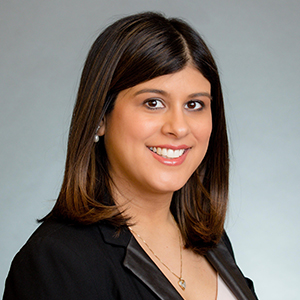
Aliah Lalani, CPA-CA, CBV
Managing Director & COO, Hilco Diligence Services
Aliah joined Hilco Diligence Services (HDS) in January 2014 as one of the first members of the HDS team. At its inception HDS had teams based in New York and Chicago and has since grown to include teams in several major cities including Boston, Chicago, New York, London, Atlanta, Montreal and Toronto. As part of her role, Aliah is responsible for managing teams in connection with new business surveys and recurring exams. She also assists with business development, client management and internal operations. In addition, Aliah is responsible for hiring, mentoring, coaching and training team members.
Aliah began her career at KPMG in Vancouver, Canada. While at KPMG, Aliah earned her Chartered Accounting designation (CPA-CA) as well as her Chartered Business Valuation (CBV) designation. Aliah commenced her time at KPMG in the audit practice focusing on high-tech and bio-tech companies and then moved to KPMG’s advisory practice focusing on business valuations and M&A. Aliah lives in Montreal, Canada with her husband and two children.
How do you define a good leader?
I have been very fortunate to work with some great leaders throughout my career. Many of these leaders have several attributes in common. One attribute that they all shared was that they were all adaptable. Situations and circumstances are constantly changing, and the ability to be flexible and adapt to these changes in a seamless manner is one attribute of a good leader.
Effective leadership and effective communication go hand in hand. A good leader communicates clearly, concisely and, in doing so, can inspire others. A good leader challenges their team by setting high standards and expectations and then giving them the skills and support to achieve their goals. Good leaders are honest, decisive and accountable.
Kat Cole, COO and president of FOCUS Brands summarized the qualities of a leader as follows: “Leadership is about the team – the culture they keep and embrace; it’s about empathy for your customers, clients, employees and the communities where you do business; it’s about doing the right thing for the right reasons, being confident enough to take risks and responsible enough to think of those who your decisions and risks may affect.”
What advice do you normally give to the junior talent you mentor?
My first piece of advice for junior talent would be don’t just have one mentor. Growth and development come from learning different perspectives and surrounding yourself with a diverse group of people.
Don’t stick with the status quo. If something isn’t the right fit for you, don’t be afraid to make a change and find something that works for you. That being said, don’t say no to opportunities and don’t be afraid to step out of your comfort zone. You never know what you are capable of until you try.
Always seek feedback. Feedback can help you grow and further develop in your career. Have regular dialogue with your mentor or supervisor and find out what you are doing well and where you need to improve. This is a good way to track your development and allows you to make strategic career decisions.
One of the best things you can do for your career is to find the right balance between your work and your personal life. You are a better, more productive person if you take care of yourself and that will manifest in both your personal life as well as your work product.
With many working remotely or hybrid-style the past few years, what are some work-life balance strategies you’ve stuck with?
The past few years working remotely have shown us that we are all adaptable and no matter the challenges thrown our way we can find a solution. In order to maintain work-life balance, one of the strategies that I have tried to stick with is to create a schedule and set boundaries. I spend a few minutes each morning planning and identifying the priorities for the day. This allows me to focus on what I need to get done for the day and set achievable goals.
In addition, when working from home it is easy to get caught up in what you are doing and let the day get away from you. At the beginning and end of each workday I try to do a short activity to create the separation between work and home. This could be something as simple as going for a short walk, writing in a journal or meditating.
Professional Development Courses
- Live online classes for ABL and Factoring professionals
- On Demand classes in Appraisals, Factoring, Legal, Workout & Bankruptcy
Learn More

.jpg?sfvrsn=f1093d2a_0)